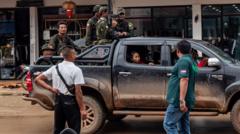Shwe Kokko, often viewed as a city of scams, presents various narratives of hope and destruction, embroiled in the complexities of crime, war, and socio-economic challenges along the Myanmar-Thailand border.
**Shwe Kokko: The Mirage City of Scams and Ambitions**

**Shwe Kokko: The Mirage City of Scams and Ambitions**
Discovering the controversial city of Shwe Kokko, Myanmar, entangled in fraudulence and a saga of ambition.
In the heart of Myanmar’s Karen State lies Shwe Kokko, a city that has materialized amidst farmland and conflict over the past eight years. Originally a desolate area marred by civil war and poverty, the emergence of tall buildings and casinos now presents a stark contradiction against its bleak surroundings. The city, which translates to Golden Raintree, has become synonymous with controversy, rife with allegations of fraud, money laundering, and human trafficking.
At the center of the city's formation is She Zhijiang, a Chinese entrepreneur currently detained in Bangkok. While his company, Yatai, endeavors to market Shwe Kokko as a luxurious escape for wealthy tourists, the realities on the ground tell a far different story. The city has attracted the scrutiny of both the Chinese and Thai governments due to its association with scams that expect to exploit vulnerable individuals, particularly targeting Chinese citizens.
Efforts to revisit and redefine the city's image have faced significant challenges. Following the military coup in Myanmar, access restrictions have tightened, and security concerns loom large. The ongoing conflict in the region complicates investment prospects, leading to dwindling tourism and economic sustainability for Shwe Kokko.
Upon visiting, the depiction of the city painted by Yatai was carefully curated, with a guided tour showcasing clean streets and luxurious villas. However, evidence suggests that the sinister underbelly, characterized by scam operations, remains rampant. Local sources indicated that Yatai’s assurances against scams don’t reflect reality, as evidence of fraudulent practices persists behind closed doors.
The genesis of Shwe Kokko aligns with the recent patterns of Chinese investments that pivot towards exploitative ventures in lawless border regions of Southeast Asia. The multi-billion-dollar scam industry thrives in this volatile environment, relying on a workforce composed of aggrieved individuals often subjected to abuse, coercion, and manipulation.
Yatai’s claims of creating a safe and environmentally responsible city are met with skepticism. Many question how legitimate businesses could flourish amid a landscape dominated by illegitimate operations. As Thailand ramps up its efforts to dismantle the scam infrastructure, the edges of Shwe Kokko's future remain uncertain.
In recent developments, notable incidents, including the rescue of a Chinese actor from a scam center, have heightened public awareness and concern. The plight of individuals trapped within these operations extends beyond Shwe Kokko, revealing broader abuses occurring in nearby areas, often overshadowed by the well-publicized fake urban oasis.
As public scrutiny increases and authorities from both Thailand and China address the issues stemming from these compromised environments, the ultimate fate of Shwe Kokko — a once hopeful dream turned into a complex web of treachery — hangs in the balance. Its narrative encompasses sordid realities of human rights abuses set against the backdrop of war-torn Myanmar, chronicling struggles for legitimacy in a world defined by deception.
At the center of the city's formation is She Zhijiang, a Chinese entrepreneur currently detained in Bangkok. While his company, Yatai, endeavors to market Shwe Kokko as a luxurious escape for wealthy tourists, the realities on the ground tell a far different story. The city has attracted the scrutiny of both the Chinese and Thai governments due to its association with scams that expect to exploit vulnerable individuals, particularly targeting Chinese citizens.
Efforts to revisit and redefine the city's image have faced significant challenges. Following the military coup in Myanmar, access restrictions have tightened, and security concerns loom large. The ongoing conflict in the region complicates investment prospects, leading to dwindling tourism and economic sustainability for Shwe Kokko.
Upon visiting, the depiction of the city painted by Yatai was carefully curated, with a guided tour showcasing clean streets and luxurious villas. However, evidence suggests that the sinister underbelly, characterized by scam operations, remains rampant. Local sources indicated that Yatai’s assurances against scams don’t reflect reality, as evidence of fraudulent practices persists behind closed doors.
The genesis of Shwe Kokko aligns with the recent patterns of Chinese investments that pivot towards exploitative ventures in lawless border regions of Southeast Asia. The multi-billion-dollar scam industry thrives in this volatile environment, relying on a workforce composed of aggrieved individuals often subjected to abuse, coercion, and manipulation.
Yatai’s claims of creating a safe and environmentally responsible city are met with skepticism. Many question how legitimate businesses could flourish amid a landscape dominated by illegitimate operations. As Thailand ramps up its efforts to dismantle the scam infrastructure, the edges of Shwe Kokko's future remain uncertain.
In recent developments, notable incidents, including the rescue of a Chinese actor from a scam center, have heightened public awareness and concern. The plight of individuals trapped within these operations extends beyond Shwe Kokko, revealing broader abuses occurring in nearby areas, often overshadowed by the well-publicized fake urban oasis.
As public scrutiny increases and authorities from both Thailand and China address the issues stemming from these compromised environments, the ultimate fate of Shwe Kokko — a once hopeful dream turned into a complex web of treachery — hangs in the balance. Its narrative encompasses sordid realities of human rights abuses set against the backdrop of war-torn Myanmar, chronicling struggles for legitimacy in a world defined by deception.




















